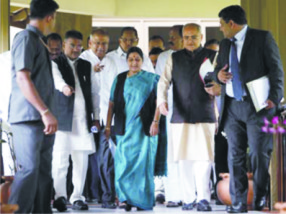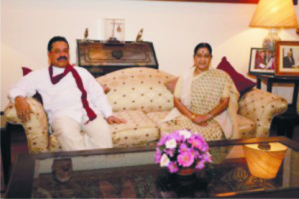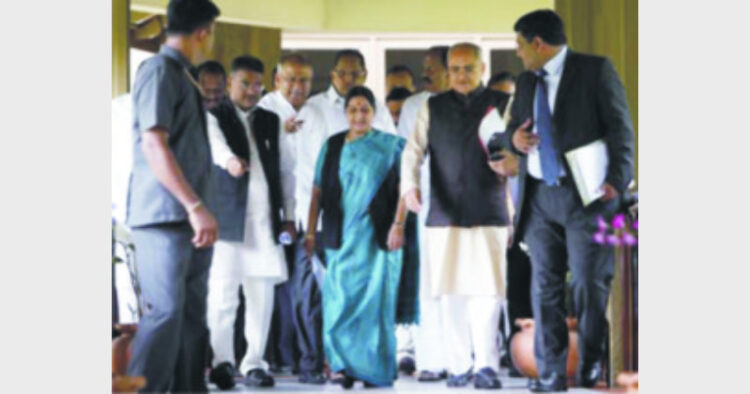Bring national reconciliation and political settlement in Sri Lanka?
Demand of Indian Parliamentary delegation led by Smt Sushma Swaraj?
V Shanmuganathan
 A 12-member Indian delegation headed by Leader of Opposition in Lok Sabha Smt Sushma Swaraj along with Parliament members from Congress, BJP, CPM, SP, BJD and JD(U) visited Sri Lanka from April 16 to 21.
A 12-member Indian delegation headed by Leader of Opposition in Lok Sabha Smt Sushma Swaraj along with Parliament members from Congress, BJP, CPM, SP, BJD and JD(U) visited Sri Lanka from April 16 to 21.
The purpose of the visit was to see the progress made since the end of the armed struggle in May 2009. They wanted to interact with wide range of people, members of civil society and political parties. The aim was to get a first hand information with regard to reconciliation and rehabilitation. It is a sincere attempt to find a way forward to achieve a lasting peace in Sri Lanka.
Sri Lankan Tamils’ issue is very emotive. Five of the members of the delegation were from Tamil Nadu. Two major political parties from Tamil Nadu, both AIADMK and DMK pulled out of the visit stating some reasons.
Tamil Nadu CM Jayalalithaa slammed the anti-Tamil approach of the Sri Lankan government for rehabilitation of internally displaced Tamils, Sri Lankans fishermen and Colombo’s recent objections to Kudankulam Nuclear Power Plant on grounds of radiation. DMK, a constituent of UPA, decided to withdraw from the delegation in the last minute.
 In spite of the boycott by two major Dravidian parties, the delegation has done a fairly good job, bringing back the focus on the post war issues to end the sufferings of Tamils and their resettlement with employment and decent life with dignity and honour.
In spite of the boycott by two major Dravidian parties, the delegation has done a fairly good job, bringing back the focus on the post war issues to end the sufferings of Tamils and their resettlement with employment and decent life with dignity and honour.
Sri Lankan Tamils’ humiliations are spoken at many political platforms. The Tamils in Sri Lanka have faced many discriminations and suffered lot for a very long period, causing severe ethnic conflict.
In fact, the delegation has done a more credible job than the previous one, belonging to DMK, Congress and Viduthalai Chiruthaikal Katchi, which visited Sri Lanka during October 2009. Smt Sushma Swaraj had a clear agenda focusing on current issues that are emerging India-Sri Lanka relations.
The BJP is very much concerned about the plight of Sri Lankan Tamils and wanted India to take a strong stand on some of the basic issues. Every member who participated in the delegation wanted Sri Lankan government to bring a broad based solution with an inclusive attitude.
The delegation called on President Shri Mahindra Rajapakse. It also had extensive discussions with several ministers, key leaders of major political parties and representatives of civil society. The delegation travelled to different parts of Sri Lanka, specially to North and East, where the Tamils are recovering from the trauma of nearly three decades of armed conflict.
They visited several sites of Indian-aided projects, including railway projects in the North and the South, the housing project, Kankesanthurai Harbour and some of the schools, hospitals and vocational training centres being revived with Indian assistance.
The delegation met several top Sri Lankan leaders including Tamil National Alliance leader R Sambandan and others. The main objective of visiting several sites was to understand the feelings of Tamils and give solace to the war victims. The delegation made a overall observation about the implementation of programmes being carried out with over Rs 25,000 crores of Indian assistance.
India’s humanitarian assistance, housing, education, public health, revival of agriculture and other livelihood activities, gave immense satisfaction to the suffering Tamil people. Smt Sushma Swaraj handed over the upgraded coastal railway line to Sri Lanka. It was completed ahead of schedule by the Indian Public Sector company, IRCON, at a cost of 167.4 million dollars.
While speaking at the function, Smt Swaraj said, ‘I am honoured to hand over the completed section of the railway track between Galle and Kautara.’
These projects serve to underline India’s commitment in peace, stability and harmony in Sri Lanka to address the needs of the war-affected people and the restoration of normalcy to their lives.
The delegation clearly spelled out its views on the political reconciliation process. It suggested that Sri Lanka should seize the opportunity and follow an enlightened approach to reach a genuine political solution based on a meaningful devolution of powers, which takes into account the legitimate needs of the Tamil people for equality, dignity, justice and self-respect.
The end of the armed conflict has provided a historic opportunity for moving towards national reconciliation and political settlement. The Lessons Learnt and Reconciliation Commission (LLRC) has underlined this and has made a number of constructive recommendations for addressing issues related to healing the wounds of the conflict and fostering a process of lasting peace and political settlement in Sri Lanka.
It is important that these are pursued with a sense of urgency. This is the message that the delegation of Indian Parliamentarians have conveyed Sri Lanka during their course of the visit.
NSV Chithan, M Krishna-swamy, EM Sudarsana Nachippan and Manik Tagore all from Congress Party termed the visit as fruitful. They said there is a sense of fear amongst the Tamils in some areas in Sri Lanka. The community is under constant watch by the Sri Lankan Army and they asked the island nation’s government to call back the Army. According to Shri Natchppan, the MPs delegation visited various places in Sri Lanka including the Menik farm where Tamils are lodged. He said the number of people lodged in the Menik camp is around 6000 down from 2,50,00 during the last visit by Indian MPs. They said the Sri Lankan government has assured them that the remaining inmates would be resettled soon.
The team members expressed a sincere hope that the government of Sri Lanka will seize the window of opportunity and follow an enlightened approach to reach a genuine political reconciliation, based on a meaningful devolution of powers, which takes into account the legitimate needs of Tamil people for equality, dignity, justice and self-respect. They have been assured in the past that this will be done within the framework of ‘Thirteenth Amendment-Plus’. Indian delegation urged the Government of Sri Lanka and other stakeholders, including the Tamil National Alliance, to resume dialogue and move towards an early political settlement.
Indian Parliamentary delegation has listed the items still outstanding in Sri Lanka’s post war recovery. It was brought out very clearly as follows:
(1) The need for expeditious implementation of the measures proposed by the LLRC with regard to information on missing persons and detainees.
(2) Investigation of cases of disappearance and objections.
(3) Reduction of high security zones.
(4) Return of the private lands by the military and demilitarisation, including phasing out the involvement of security forces in civilian activities and restoration of the civilian administration in the Northern Province.
(5) Withdrawal of security forces from community life and confine their role to security matters.
After completing the intense visit of Sri Lanka, the team came back to Delhi. Commenting on the overall impact of the trip. Smt Sushma Swaraj said, “The delegation visited Sri Lanka with a definite mission and purpose to bring peace. From 6 am to 11 pm we were moving from one end of Sri Lanka to the other. We visited Colombo, Jaffna, Mullaitivu, Vavuniya, Kankesanthurai, Batticola and many more areas. We met top most people of government, various Tamil leaders and ordinary people of Sri Lanka. I am happy to note that our relations are moving ahead in a comprehensive manner. We insisted for demilitarisation, political settlement. I have a sincere hope that Tamils will be rehabilitated in a dignified manner with political empowerment.”?














Comments